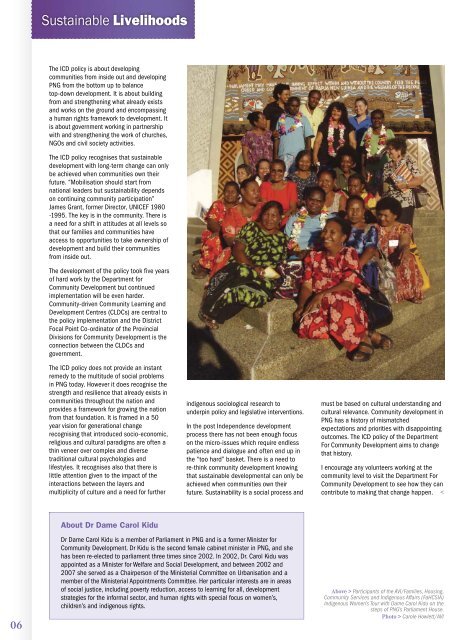Download - Australian Volunteers International
Download - Australian Volunteers International
Download - Australian Volunteers International
Create successful ePaper yourself
Turn your PDF publications into a flip-book with our unique Google optimized e-Paper software.
06<br />
Sustainable Livelihoods<br />
The ICD policy is about developing<br />
communities from inside out and developing<br />
PNG from the bottom up to balance<br />
top-down development. It is about building<br />
from and strengthening what already exists<br />
and works on the ground and encompassing<br />
a human rights framework to development. It<br />
is about government working in partnership<br />
with and strengthening the work of churches,<br />
NGOs and civil society activities.<br />
The ICD policy recognises that sustainable<br />
development with long-term change can only<br />
be achieved when communities own their<br />
future. “Mobilisation should start from<br />
national leaders but sustainability depends<br />
on continuing community participation”<br />
James Grant, former Director, UNICEF 1980<br />
-1995. The key is in the community. There is<br />
a need for a shift in attitudes at all levels so<br />
that our families and communities have<br />
access to opportunities to take ownership of<br />
development and build their communities<br />
from inside out.<br />
The development of the policy took five years<br />
of hard work by the Department for<br />
Community Development but continued<br />
implementation will be even harder.<br />
Community-driven Community Learning and<br />
Development Centres (CLDCs) are central to<br />
the policy implementation and the District<br />
Focal Point Co-ordinator of the Provincial<br />
Divisions for Community Development is the<br />
connection between the CLDCs and<br />
government.<br />
The ICD policy does not provide an instant<br />
remedy to the multitude of social problems<br />
in PNG today. However it does recognise the<br />
strength and resilience that already exists in<br />
communities throughout the nation and<br />
provides a framework for growing the nation<br />
from that foundation. It is framed in a 50<br />
year vision for generational change<br />
recognising that introduced socio-economic,<br />
religious and cultural paradigms are often a<br />
thin veneer over complex and diverse<br />
traditional cultural psychologies and<br />
lifestyles. It recognises also that there is<br />
little attention given to the impact of the<br />
interactions between the layers and<br />
multiplicity of culture and a need for further<br />
About Dr Dame Carol Kidu<br />
indigenous sociological research to<br />
underpin policy and legislative interventions.<br />
In the post Independence development<br />
process there has not been enough focus<br />
on the micro-issues which require endless<br />
patience and dialogue and often end up in<br />
the “too hard” basket. There is a need to<br />
re-think community development knowing<br />
that sustainable developmental can only be<br />
achieved when communities own their<br />
future. Sustainability is a social process and<br />
Dr Dame Carol Kidu is a member of Parliament in PNG and is a former Minister for<br />
Community Development. Dr Kidu is the second female cabinet minister in PNG, and she<br />
has been re-elected to parliament three times since 2002. In 2002, Dr. Carol Kidu was<br />
appointed as a Minister for Welfare and Social Development, and between 2002 and<br />
2007 she served as a Chairperson of the Ministerial Committee on Urbanisation and a<br />
member of the Ministerial Appointments Committee. Her particular interests are in areas<br />
of social justice, including poverty reduction, access to learning for all, development<br />
strategies for the informal sector, and human rights with special focus on women’s,<br />
children’s and indigenous rights.<br />
must be based on cultural understanding and<br />
cultural relevance. Community development in<br />
PNG has a history of mismatched<br />
expectations and priorities with disappointing<br />
outcomes. The ICD policy of the Department<br />
For Community Development aims to change<br />
that history.<br />
I encourage any volunteers working at the<br />
community level to visit the Department For<br />
Community Development to see how they can<br />
contribute to making that change happen. <<br />
Above > Participants of the AVI/Families, Housing,<br />
Community Services and Indigenous Affairs (FaHCSIA)<br />
Indigenous Women’s Tour with Dame Carol Kidu on the<br />
steps of PNG’s Parliament House.<br />
Photo > Carole Howlett/AVI


